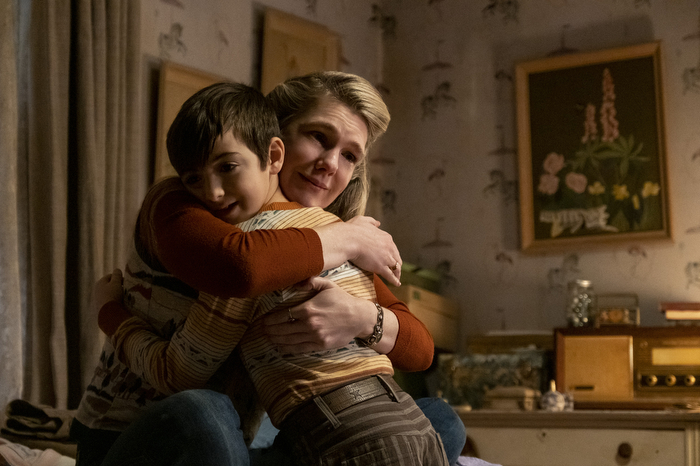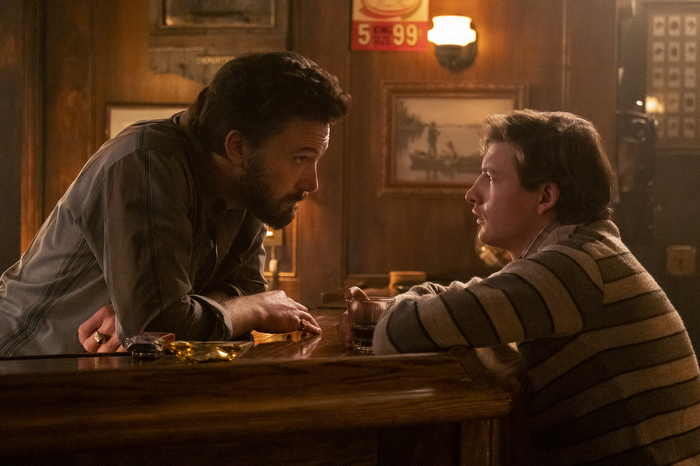Even an earnest performance from a wistful Ben Affleck can’t save George Clooney’s latest film from the nothingness of its direction.
Adapted from the memoirs of J. R. Moehringer, The Tender Bar (2021) follows his story of overcoming a neglectful father in the pursuit of his dream of becoming a writer. We’re introduced to a 9-year-old J. R. (Daniel Ranieri) in 1973, as he and his mother (Lily Rabe) move into their grandparents’ house after falling behind on rent payments. It’s to be more than just a short stay with the house, with the family they find there being one of the constants of the story. In this move, J. R. soon strikes a bond with his uncle Charlie (Ben Affleck) who owns the local bar and learns to play a key role in his nephew’s life. He puts the tender in the bar.
We’re told from the start that J. R.’s father hasn’t been present in years; J. R. doesn’t even remember having seen his face. However, that doesn’t stop the cloud of his memory hanging over scenes from the very beginning. He takes up the more mystical role of “The Voice”, his job as a radio DJ in turn giving his son the job of searching the airwaves to form a connection with his absent father. It’s this relationship and J. R.’s methods of coping with its effects that propel the narrative forward and form their own measure of J. R.’s coming-of-age.
It starts swimmingly, opening with Radar Love blasting as J. R. and his mum speed along on the road to a new start. Sadly, its coming-of-age roots don’t extend much further than that promising opening. We’re soon introduced to a meandering plot full of whiplash-inducing cuts that make the film feel doomed as soon as they leave the comfort of the car.
At its best, it shows the warmth of family, those of blood and those who simply care about you. It can even feel close to tender at times. Ben Affleck does all that he can to be the earnest, affectionate uncle he was cast to play, turning in the standout performance of the film. However, these moments are all too short and get quickly swept away in a flurry of uninteresting deviations.
J. R. is lead character and narrator, and a very active one for the opening of the film. We benefit from an older J. R. providing needed context to his younger self’s situation. However, there’s a part where there is a sudden skip in the chronology. Young J. R. is left behind as we jump to an older J. R. (Tye Sheridan), who has traded very underage drinking for underage drinking and university applications. Writing is the connecting thread that aims to link these two parts of the story. However, this motivating passion is one which is left severely underdeveloped on screen.

There are some painful lines in the script. Whether he’s at school, at home, or listening to the radio, we only ever get a chance to view J. R. with a direct reference to his father. There’s no subtlety either, lines are delivered like pop-up ads to tell J. R. and the audience that actually we should be thinking about his relationship with his dad in this moment. Plot devices are dropped in and shown little attention afterwards, serving as blunt instruments to keep the clock ticking along. It’s disheartening to see clear motivators for J. R. being reduced to a clumsy line of dialogue or a few seconds of screen time. His passion for writing, which we’re told is the driving force behind his growth, feels more like career development than character development.
The production behind The Tender Bar would have been well-advised to follow the adage of ‘show, don’t tell’. We’re repeatedly told what J. R.’s adversities and dreams are, but we are shown very little of them. There’s no subtext here and it doesn’t work.
In all of this, J. R.’s mother, a key motivator for J. R. and the one who has been with him through all of this, often feels forgotten. It’s in the very obvious search for a father figure that Clooney neglects to explore the fuller picture of his upbringing and the consequences his absent father had for his whole family. In fact, even the characters we see most of, including Uncle Charlie and J. R., change little throughout the entire film. Despite growing up and moving out, J. R. feels like he’s not deepened as a character one bit, and Uncle Charlie’s backstory is left woefully unexplored.
Further plot points, most notably a flash-in-the-pan romantic interest that simultaneously spans years of his young adulthood, feed into what feels like a meaningless merry-go-round. These parts appear as if revealed by God and disappear just as quickly, leaving little lasting impression on the story or the viewer. These opportunities for further character development are missed time and timed again, leaving us with shallow characters who feel unimportant even in their own lives.
The closing act isn’t strong but is by far the strongest part of the film when we are clearly shown actions and feel their consequences in the pits of our stomachs. It reinforces how little of an opportunity both the audience and the actors are given in the rest of the film.
The real shame of The Tender Bar is that the plot and narrative structure take away from the earnest efforts of each actor on screen. There’s only so much they can do with a script full of howlers and a plot that feels like someone fell asleep on the escape key. Everyone on screen deserves more than this, most of all the young J. R., who puts in a decent debut performance against all odds.
The Tender Bar is a wasted opportunity to tell a unique story or show how a mundane story can relate to our own lives. Its a story full of people that deserve extra chances. Sadly, its film adaptation makes us think it’s the actors rather than the characters that need that chance the most.
The Tender Bar releases in select cinemas from 17th December and will be streaming on Prime Video from 7th January 2022.
